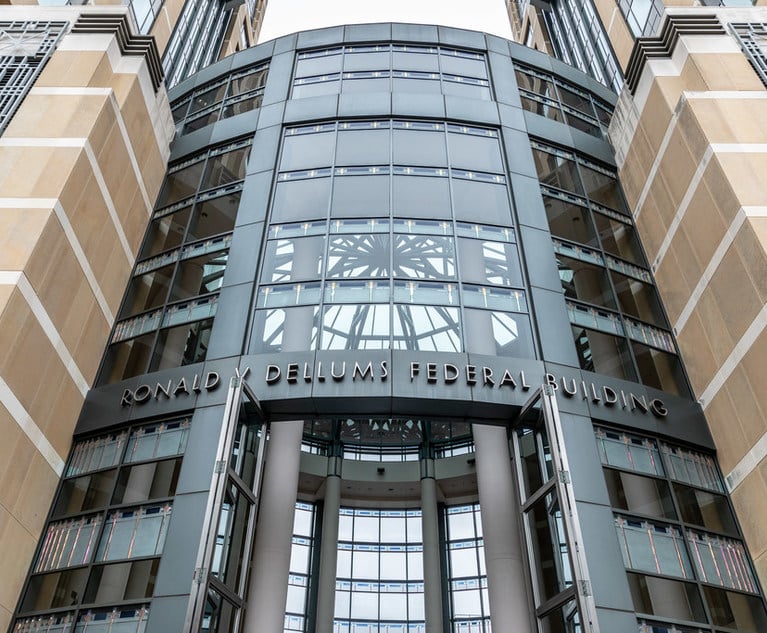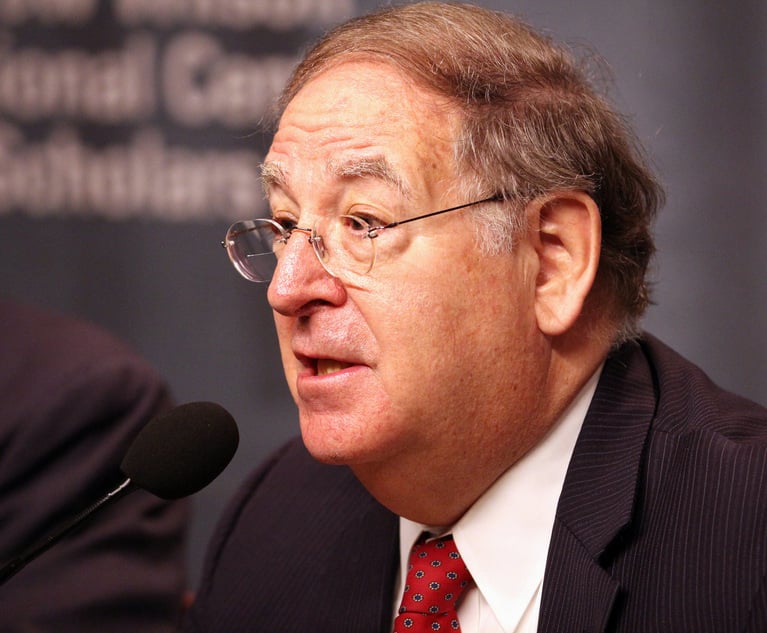Fed. Appeals Court Deals Setback in Settlement of ACA Payments Case
The D.C. Circuit declined to grant the parties' joint motion to dismiss a case between the Trump administration, House Republicans and a coalition of Democratic state attorneys general over the legality of insurer subsidies under the Affordable Care Act—jeopardizing the agreement the parties reached in the litigation late last year.
March 08, 2018 at 03:00 PM
2 minute read
 Affordable Care Act application on Healthcare.gov site.
Affordable Care Act application on Healthcare.gov site. A settlement between the Trump administration, House Republicans and a coalition of Democratic state attorneys general over the legality of insurer subsidies under the Affordable Care Act has hit a potential snag.
The U.S. Court of Appeals for the D.C. Circuit declined to grant the parties' joint motion to dismiss the case, jeopardizing the agreement they reached in the litigation late last year.
The proposed settlement sought to vacate a ruling by U.S. District Judge Rosemary Collyer of the District of Columbia that the Obama administration, in the absence of congressional appropriation, unlawfully paid cost-sharing reduction payments. So-called CSRs were designed to offset the cost of discounts that insurers were required to give eligible lower-income Americans under the ACA.
In an earlier ruling in the case, Collyer also found that the House had standing to sue over the billions of dollars in payments. With regard to that ruling, the proposed settlement stated that the parties agree that the ruling remains, but does not “control” decisions in future litigation over this issue.
Because the parties' proposed agreement sought to undo just one of Collyer's rulings, a three-judge panel of the D.C. federal appellate court suggested that doing so may not be permissible and asked for further briefing on the matter.
“While not otherwise limited, the parties are directed to explain [in their supplemental briefs] what 'exceptional circumstances' justify partial vacatur,” according to the order.
In October, President Donald Trump said that he would end the subsidy payments, which paved the way to the settlement. It also prompted the attorneys general in 17 generally Democratic-led states and D.C., including California and New York, to bring a lawsuit in federal court forcing federal regulators to continue making the payments.
The case, California v. Trump, is pending in San Francisco, with a hearing scheduled for later this month.
This content has been archived. It is available through our partners, LexisNexis® and Bloomberg Law.
To view this content, please continue to their sites.
Not a Lexis Subscriber?
Subscribe Now
Not a Bloomberg Law Subscriber?
Subscribe Now
NOT FOR REPRINT
© 2025 ALM Global, LLC, All Rights Reserved. Request academic re-use from www.copyright.com. All other uses, submit a request to [email protected]. For more information visit Asset & Logo Licensing.
You Might Like
View All
Read the Document: DOJ Releases Ex-Special Counsel's Report Explaining Trump Prosecutions
3 minute read
Crypto Exchange’s ‘Meteoric Rise’ Leads to Nationwide Class Action Trend
4 minute read
Veteran Federal Trade Law Enforcer Joins King & Spalding in Washington
4 minute read
'Thoughtful Jurist': Maryland US District Senior Judge Messitte Dies After Short Illness
4 minute readTrending Stories
- 1Courts Grapple With The Corporate Transparency Act
- 2FTC Chair Lina Khan Sues John Deere Over 'Right to Repair,' Infuriates Successor
- 3‘Facebook’s Descent Into Toxic Masculinity’ Prompts Stanford Professor to Drop Meta as Client
- 4Pa. Superior Court: Sorority's Interview Notes Not Shielded From Discovery in Lawsuit Over Student's Death
- 5Kraken’s Chief Legal Officer Exits, Eyes Role in Trump Administration
Who Got The Work
J. Brugh Lower of Gibbons has entered an appearance for industrial equipment supplier Devco Corporation in a pending trademark infringement lawsuit. The suit, accusing the defendant of selling knock-off Graco products, was filed Dec. 18 in New Jersey District Court by Rivkin Radler on behalf of Graco Inc. and Graco Minnesota. The case, assigned to U.S. District Judge Zahid N. Quraishi, is 3:24-cv-11294, Graco Inc. et al v. Devco Corporation.
Who Got The Work
Rebecca Maller-Stein and Kent A. Yalowitz of Arnold & Porter Kaye Scholer have entered their appearances for Hanaco Venture Capital and its executives, Lior Prosor and David Frankel, in a pending securities lawsuit. The action, filed on Dec. 24 in New York Southern District Court by Zell, Aron & Co. on behalf of Goldeneye Advisors, accuses the defendants of negligently and fraudulently managing the plaintiff's $1 million investment. The case, assigned to U.S. District Judge Vernon S. Broderick, is 1:24-cv-09918, Goldeneye Advisors, LLC v. Hanaco Venture Capital, Ltd. et al.
Who Got The Work
Attorneys from A&O Shearman has stepped in as defense counsel for Toronto-Dominion Bank and other defendants in a pending securities class action. The suit, filed Dec. 11 in New York Southern District Court by Bleichmar Fonti & Auld, accuses the defendants of concealing the bank's 'pervasive' deficiencies in regards to its compliance with the Bank Secrecy Act and the quality of its anti-money laundering controls. The case, assigned to U.S. District Judge Arun Subramanian, is 1:24-cv-09445, Gonzalez v. The Toronto-Dominion Bank et al.
Who Got The Work
Crown Castle International, a Pennsylvania company providing shared communications infrastructure, has turned to Luke D. Wolf of Gordon Rees Scully Mansukhani to fend off a pending breach-of-contract lawsuit. The court action, filed Nov. 25 in Michigan Eastern District Court by Hooper Hathaway PC on behalf of The Town Residences LLC, accuses Crown Castle of failing to transfer approximately $30,000 in utility payments from T-Mobile in breach of a roof-top lease and assignment agreement. The case, assigned to U.S. District Judge Susan K. Declercq, is 2:24-cv-13131, The Town Residences LLC v. T-Mobile US, Inc. et al.
Who Got The Work
Wilfred P. Coronato and Daniel M. Schwartz of McCarter & English have stepped in as defense counsel to Electrolux Home Products Inc. in a pending product liability lawsuit. The court action, filed Nov. 26 in New York Eastern District Court by Poulos Lopiccolo PC and Nagel Rice LLP on behalf of David Stern, alleges that the defendant's refrigerators’ drawers and shelving repeatedly break and fall apart within months after purchase. The case, assigned to U.S. District Judge Joan M. Azrack, is 2:24-cv-08204, Stern v. Electrolux Home Products, Inc.
Featured Firms
Law Offices of Gary Martin Hays & Associates, P.C.
(470) 294-1674
Law Offices of Mark E. Salomone
(857) 444-6468
Smith & Hassler
(713) 739-1250










